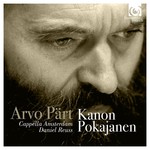
Pärt: Kanon pokajanen
 $35.00
Out of Stock
$35.00
Out of Stock6+ weeks add to cart
ARVO PART
Pärt: Kanon pokajanen
Cappella Amsterdam, Daniel Reuss
[ Harmonia Mundi / CD ]
Release Date: Friday 24 February 2017
This item is currently out of stock. It may take 6 or more weeks to obtain from when you place your order as this is a specialist product.
The 'Kanon Pokajanen' (Canon of Repentance), premiered in March 1998, is Arvo Pärt's most monumental composition.
Its prolonged genesis, a meticulous process of assimilation of the text in Church Slavonic, and the austerity and subtlety of its style embody the same sincerity, the same spiritual and contemplative radiance as an icon painting.
He was commissioned by KölnMusic GmbH to write a work commemorating the 750th anniversary of the building of Cologne Cathedral. He finished it in 1997 and it premiered at Cologne Cathedral on March 17, 1998.
'Kanon Pokajanen' exhibits characteristics of Pärt's tinntinabular style and the piece remains almost exclusively in D minor, deviating only in particularly expressive passages and sometimes final cadences. Overall, the melodies and harmonies remain fairly static throughout.
Perhaps the greatest of the 'holy minimalists' [along with Henryk Górecki and Sir John Tavener] Arvo Pärt describes his encounter with the text and the history of setting this text to music thus: "Many years ago, when I first became involved in the tradition of the Russian Orthodox Church, I came across a text that made a profound impression on me although I cannot have understood it at the time. It was the Canon of Repentance.
Since then I have often returned these verses, slowly and arduously seeking to unfold their meaning. Two choral compositions (Nun eile ich...., 1990 and Memento, 1994) were the first attempts to approach the canon. I then decided to set it to music in its entirety-from beginning to end. This allowed me to stay with it, to devote myself to it; and, at the very least, its hold on me did not abate until I had finished the score. I had a similar experience while working on Passio.
It took over two years to compose the Kanon pokajanen, and the time "we spent together" was extremely enriching. That may explain why this music means so much to me"
"The Cappella Amsterdam, who recently gave us such an excellent Brahms disc, here give the most convincing impression of an eastern Orthodox choir that I think I've ever heard from a group of western Europeans. The upper voices are tight and totally on the note, while the basses anchor the whole performance with their dark, dreamy drone that is so intrinsic to the work's success" MusicWeb
"In striving to get to the essence of the words, Pärt has created 'a precious island in the inner seclusion of our soul', and Cappella Amsterdam under Daniel Reuss more than do justice to Kanon Pokajanen's distilled purity and sublime beauty" Gramophone
Tracks:
Ode I
Ode III
Ode IV
Ode VI
Kontakion
Ikos
Ode VIII
Ode IX
Prayer after the canon



